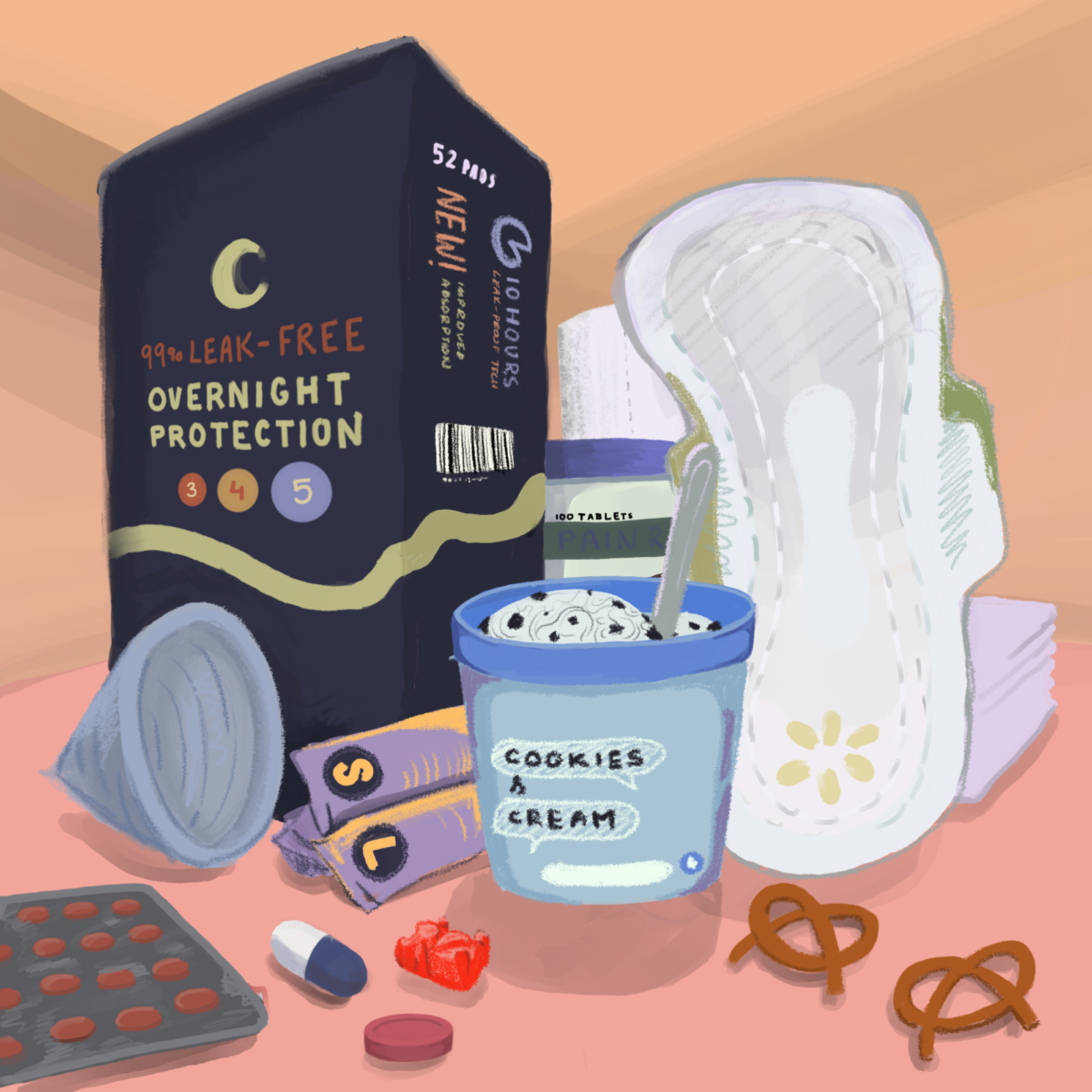I bled out of my vagina. For one week of every month. And it’s normal, healthy even. And yet, as I wrote that sentence I still felt a twinge of shame. Behind the bravado of me pushing for open conversations surrounding menstruation and women’s health, sits an iota of discomfort. I worry it’s wrong to talk about and that I’ll ostracize myself. And I hear that same worry in my friends when we talk about our periods. Their voice drops as if sharing a shameful secret. “All you ever hear is that you should be ashamed and hide it,” a senior points out. But the truth is that all cis-gendered women (and some gender-fluid/trans men) have periods, and it’s normal. And it’s also normal for people who don’t menstruate to not think about something that doesn’t directly affect them. But what’s less normal is treating periods and sexual health as something to be disgusted by. Sexual health can be uncomfortable, but that doesn’t give anyone the right to act immaturely about it. In addition, it’s vitally important to educate ourselves. So, for those of you who never learned, listen up! Because breaking the stigma surrounding menstruation might take a little more than an iota of discomfort.
Let’s talk numbers: 28 days is the typical length of a menstrual cycle, but anywhere from 24-38 days is also considered regular. The menstrual cycle is counted from the first day of bleeding to the next day first day. Two-to-seven days is how long a typical period is, the time when you are actively bleeding and usually dealing with the worst of the symptoms. The length of a period can also vary due to lifestyle factors such as stress or physical exercise or whether or not someone is taking birth control. The heaviness of a flow is describing how much you are bleeding. In fact, an average person loses about 2-3 tablespoons of blood during their cycle. 12-14 are the ages at which most people get their periods, but it can vary in age. 45-55 is when most women stop getting their periods, which is called menopause.
I think the school needs to have a better sex-ed curriculum…all of this stuff that I had to figure out from Instagram or family members.
— ETHS Senior
The quick and dirty science of the menstrual cycle is this: females have two ovaries, both of which hold eggs. During the time after a period—which is when the bleeding occurs— the lining of the uterus is being built up in preparation for a pregnancy. Once a month, about halfway through the menstrual cycle, hormones tell the body to release a mature egg from either ovary, this is called ovulation. The egg will travel down the fallopian tube and into the uterus, the whole time waiting to be fertilized. If the egg is fertilized, then boom! Pregnancy! If it isn’t fertilized then the lining of the uterus is broken down and released: Voila, a period!
Common period products include pads, pantyliners, tampons, menstrual cups/disks and period underwear. Pads are worn external and stick to the inside of underwear. Pads without flaps on the sides are typically called pantyliners and are usually a thinner material for light flow days. Tampons and menstrual cups are worn internally. Tampons are inserted into the vagina and soak up blood. Menstrual cups/disks that are inserted into the vagina and sit in the canal and hold blood in the cup. Both menstrual cups/disks and tampons allow women to swim and engage in physical exercises. Period underwear is just that: underwear that is built to absorbent and can be worn on days when you have your period. All of these are considered feminine hygiene products and just as essential as toilet paper and the fact that many students find the tampon/pad dispensers empty is a recurring complaint that one student shared: “Basically, I wish that they would refill the tampon containers more often than they do, because they’re 90 percent of the time empty.”
Due to bad symptoms or irregular periods some people might decide to take birth control, “Before I started birth control, I had extremely bad cramps that would cause me to throw up or miss events, parties, school. That was my main issue,” one student shares. Depending on the type of birth control, some symptoms can be relieved but others can be made worse. One senior claimed, “There were other side effects [of the birth control] I didn’t like, so that’s why I stopped.” Another added, “Like more fatigue, especially with the birth control that I’m on. My cramps are getting worse.”
As one senior brought up, the problem is with sex-ed in the first place. “I think the school needs to have a better sex-ed curriculum…all of this stuff that I had to figure out from Instagram or family members.”
The problem is how much research I had to do to write this piece. While some people learn about menstruation and the science behind menstruation, there is often nobody teaching you how to put in a tampon or menstrual cup. Having a period can be a very isolating experience, wondering if you’re normal or not. But the truth is you’re not alone, and while it’s okay to feel uncomfortable or even ashamed, you don’t have to.
“I’m done being ashamed and secretive about something that has caused me so much pain and continues to cause me pain,” one student voices.


















